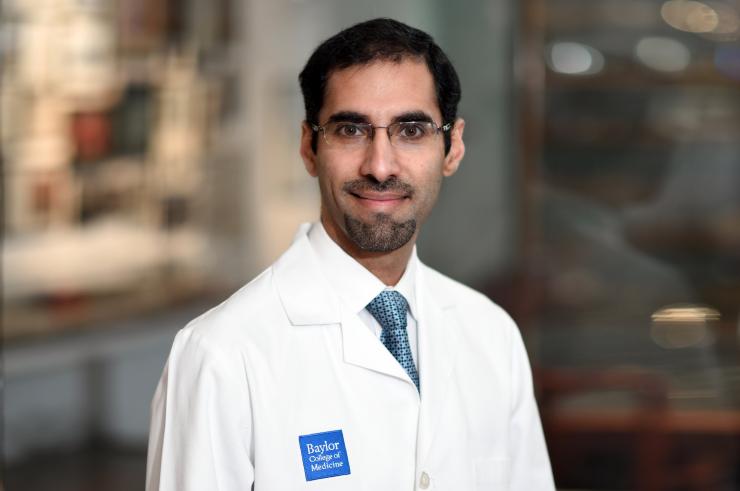Expert dispels common colorectal cancer surgery myths

A permanent ostomy bag and a long recovery are often associated with colorectal cancer surgery, but according to a surgeon at Baylor College of Medicine, advances in the field mean that these concerns could be a thing of the past.
Dr. Atif Iqbal, chief of colorectal surgery in the Michael E. DeBakey Department of Surgery at Baylor, dispels some common myths and explains how Baylor’s multidisciplinary approach to treating these cancers improves patient outcomes.
Myth: You will have a permanent colostomy bag following colorectal cancer surgery.
Fact: While some surgeons treat colorectal cancer, specifically rectal cancer, using a procedure that results in a permanent colostomy bag, restorative colorectal surgeons are more specialized. They are able to reconnect the intestines with the anus using specialized techniques as opposed to making a permanent colostomy bag.
“Data suggests that patients of surgeons who perform more surgeries that result in a permanent colostomy bag have a longer length of stay in the hospital, a higher chance of the tumor coming back and a higher chance of death,” said Iqbal, who also is a member of the NCI-designated Dan L Duncan Comprehensive Cancer Center at Baylor.
According to Iqbal, who operates at Baylor St. Luke’s Medical Center, there also is data to suggest that a patient with colorectal cancer who is operated on by a colorectal specialist has a lower risk of mortality and return of cancer.
Myth: Recovery from colorectal cancer surgery requires a long stay in the hospital.
Fact: Recovery has changed quite a bit thanks to enhanced recovery after surgery (ERAS) protocols, which rely on evidence-based medicine to direct patient care and recovery after surgery. While patients used to stay in the hospital for seven to 12 days after major abdominal surgery, the length of stay has now been significantly reduced, usually to between one and three days.
“The enhanced recovery after surgery protocol starts even before the patient arrives at the hospital. In fact, it starts a couple of weeks before surgery and goes through their postoperative recovery,” Iqbal said.
Previously, patients were told not to eat or drink starting at midnight on the day of surgery, even if their case was later in the day. Because this can cause dehydration and low-sugar levels before they go into the operating room, patients are now told to continue their liquid diet up to three hours before the surgery. In addition, patients can have a liquid diet immediately following their surgery and can go to a regular diet the next morning. Most patients also are able to avoid tubes in their nose/mouth or drains after surgery.
Another change in the recovery is that patients do not have to wait for their bowels to start functioning before they are able to eat or before they are able to be discharged from the hospital.
“We have found that the quicker we feed them, the better the patients do because a portion of the nutrition for the bowel comes from the food within the bowel, so if you’re not feeding the gut, you’re essentially starving the gut itself,” Iqbal said.
Myth: Postoperative pain control will require narcotics.
Fact: The opioid addiction crisis across the country can make many people hesitant to use narcotics to control their pain, but Iqbal said that many surgeons are now giving a combination of different non-narcotic medications to provide pain control in both the postoperative inpatient and outpatient setting.
”Most of our patients are not needing any narcotics after surgery anymore, while they continue to have adequate pain control,” Iqbal said.
Why choose a multidisciplinary center?
Iqbal says when selecting a center for colorectal cancer treatment, look for a restorative colorectal surgeon and a surgeon and a hospital where a high volume of these cases have been treated – there is data to show that all of these independently impact outcomes.
“You need to be taken care of by people who do this day in and day out,” Iqbal said.
Seek out a center where the care is not fragmented. A true multidisciplinary program brings all specialists the patient needs under one umbrella, requiring no separate appointments with different doctors in different locations.
“Our team works together to explore the best medical or surgical option to ensure the most successful outcome for the patient,” Iqbal said.
His approach is to provide combined clinics with medical oncologists for cancer patients and gastroenterologists for IBD patients.
“We are able to provide a seamless patient experience with good communication between physicians. We see the patients together in the same room and provide an outline of their care to them. Patients can make informed decisions about their care with all members of their treatment team in the same room,” Iqbal said. “Additionally, cancer patients are reviewed at weekly tumor board conferences for multidisciplinary input, including discussing of new or experimental treatments. This helps us involve our expert specialists from colorectal surgery, medical oncology, radiation oncology, gastroenterology, pathology, radiology and other specialists as needed in formulating a succinct plan for the patient in a timely fashion.”
His team provides minimally invasive, laparoscopic, robotic and transanal procedures to treat patients with colorectal cancer and is aggressive in avoiding the use of ostomy bags. Using multiple methods, including a specialized technique, robotic transanal total mesorectal excision, for the procedures allows for better visualization so the surgeons are able to ensure that the entire tumor is removed while avoiding a permanent ostomy bag.










